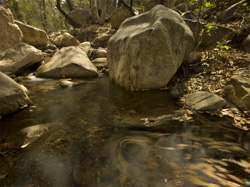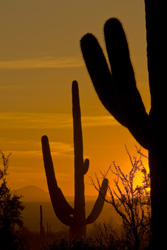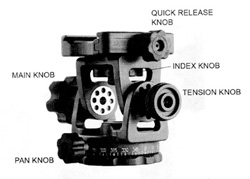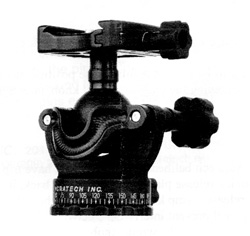Joe and Mary
Ann McDonald's
Wildlife Photography
May-June 2008
Tip of the Month
Two Sturdy Light-Weight Tripod Heads
On our recent Arizona High Speed Flash Photography Shoot Mary
and I had a chance to try two new tripod heads, both offered by
Acratech, Inc. If memory
serves me, the owner/inventor of the Acratech tripod heads is
a backpacker who was frustrated with the size and weight of available
tripod heads, and being an inventive guy he designed and built
his own!


Both images were made using Gitzo Mountaineer
Tripods and AcraTech Tripod Heads,
and both involved very slow shutter speeds. In fact, the Madera
Canyon scene was a twenty
second exposure made with a Singh Ray Variable Neutral Density
Filter cranked down to
an 8 stop ND level. Both the tripod and the tripod head held up
to these slow speeds.
Of the two heads we tried, the LONG LENS HEAD was our favorite,
mainly because we often use big lenses, and that head accommodates
them very well. The head is designed to hold lenses as large as
600mm, and I used the head with that lens, and Mary used it with
the 500mm. We both found that it held these large lenses very
well. I did have a bit of wiggle or play in the panning portion
of the head, but that may have been operator error on my part
in not tightening the pan knob as tightly as I could have. Even
so, that was a very minimal criticism that did not affect our
use, or the performance, of the head.
 Mary
complained that she got her fingers 'mouse-trapped' a couple of
times because the main knob/tension knob, when not locked tight,
allowed the lens to swing down and thus clamp her fingers, but
that was her error, and she'd have experienced that with any head
short of a Gimbal-style like the Wimberley which keeps its center
of gravity (if you've balanced the lens correctly). Short of that,
however, she loved the head and so did I, and for our upcoming
trip to Botswanna where we will be severely limited in weight
we're going to buy another one so that we both our carrying that
head with us for the trip.
Mary
complained that she got her fingers 'mouse-trapped' a couple of
times because the main knob/tension knob, when not locked tight,
allowed the lens to swing down and thus clamp her fingers, but
that was her error, and she'd have experienced that with any head
short of a Gimbal-style like the Wimberley which keeps its center
of gravity (if you've balanced the lens correctly). Short of that,
however, she loved the head and so did I, and for our upcoming
trip to Botswanna where we will be severely limited in weight
we're going to buy another one so that we both our carrying that
head with us for the trip.
Bottom line, for a very light weight ballhead that is very
sturdy, the Acratech long lens head is excellent. To be fair,
I haven't tried the ReallyRightStuff smaller ballheads or the
Giotto's, as both manufacturers make smaller heads, and for the
record my 'standard' ballhead for everyday field use is a RRS
BH-55 head. However, for travel, and we do a lot of it, I really
liked the Acratech, enough that we're going to get a second head.
We also tried the GV2 ballhead, using it as a standard ballhead.
It, too, is extremely lightweight and when attached to a Gitzo
Mountaineer carbon-fiber tripod, the package was extremely lightweight,
and virtually effortless to carry. I found that this was the rig
I carried around from one hummingbird set to another, using any
of the following three lenses - 28-300, 70-200 F4, and the 100-400.
Coupled with the lightweight Canon 70-200 F4, I had a rig that
was as portable and lightweight as I could imagine.
I also carried that system around through Madera Canyon as
I looked for canyon treefrogs and shot scenics of the canyon and
the beautiful sycamore trees that line the waterway. For this
I generally carried the versatile 28-300, and the lack of weight
made the whole system a joy. As I write this, I can't help but
think how I used to carry a metal heavy-duty, big Gitzo tripod,
the original Wimberley head, and a 600mm. I was younger, then,
and dumber, maybe .... OK, I wish I still had that type of strength
and energy!
 Like
any ballhead, the GV2 can flop and trap your fingers if the head
is loosened, but when locked down it held. I had a bit of drift
when I carried the rig over my shoulder, as the weight torqued
the system, but that only resulted in the camera/lens nestling
more comfortably on my shoulder. One caution I'd advance when
using the head concerns the quick-release locking knob. Since
both heads (GV2 and Long Lens Head) were new to me and thus relatively
unfamiliar, I found myself sometimes reaching for the wrong knob
and begin to unlock the quick-release mechanism, rather than loosening
the tension knob. Fortunately I caught myself each time and didn't
drop a lens. Familiarity with the head, and a bit of practice,
and I don't think this potential error would be a problem.
Like
any ballhead, the GV2 can flop and trap your fingers if the head
is loosened, but when locked down it held. I had a bit of drift
when I carried the rig over my shoulder, as the weight torqued
the system, but that only resulted in the camera/lens nestling
more comfortably on my shoulder. One caution I'd advance when
using the head concerns the quick-release locking knob. Since
both heads (GV2 and Long Lens Head) were new to me and thus relatively
unfamiliar, I found myself sometimes reaching for the wrong knob
and begin to unlock the quick-release mechanism, rather than loosening
the tension knob. Fortunately I caught myself each time and didn't
drop a lens. Familiarity with the head, and a bit of practice,
and I don't think this potential error would be a problem.
The GV2 can also be used as a Gimbal-style head by flopping
it over into the side slot, and in this capacity can be used with
long lenses for action shooting. I did not use the GV2 head in
this way, but I did use it with my 600mm attached. Granted, it
wasn't a rock-steady mount, but frequently I don't lock any head
down but instead I keep the head somewhat loose so that I'm free
to move the lens about as I'm following a subject. In this capacity
this lightweight head did alright, and it would serve in a pinch
in that capacity.
Final thoughts -- we really liked the long lens head, and we're
going to get a second for our trip to Botswanna. I liked the GV2,
too, and I would definitely recommend it if you need a very lightweight
but fairly sturdy ballhead. With lenses like the 70-200 or 28-300
or 100-400, the GV2 will do just fine. Check out their website
or their email for more
information and ordering specs.
Either tripod head, but particularly the GV2, might be the
perfect combination if you're thinking of using a Monopod, as
we're considering for a future Rwanda mountain gorilla trip.In
the jungles and thick bamboo forest a tripod can be a hindrance,
and a new Monopod might be the perfect answer for those who want
support but are either unwilling or unable to carry a tripod.
Not too infrequently, on our gorilla treks someone starts with
a tripod but by the third day abandons it for the greater freedom
a tripod-free shooter has, even though their images undoubtably
suffered from the handholding. The Monopod might be the answer.
We just tried out a new Monopod, called the Trek-Pod Go!, make
by trekpod (trek-tech.com)
and we liked it. It extends to full height, breaks down into three
approximately 20 inch sections, and has a small flange-style tripod
arrangement at the base for added support. My only misgivings
about using it in the Rwanda forest is that I often shoot very,
very low, and the minimum height might still be higher than I'd
like. However, I could unscrew a column, and by tilting the Monopod,
and using the GV2 head, I could probably get the support I'd need.
I'll be trying it out in my gorilla-free woods here in Hoot Hollow.
I'll be reporting more on this later.
Our Past Photo Tips
of the Month:
DIGITAL
DEC - A solution to the Digital Dilemma
Western Digital portable external Hard Drives
CS3 Upgrade
Framing with a Telephoto Against a Desert Sunrise
Adobe
Photoshop LIGHTROOM
Workflow
and Workload - You Can Keep Ahead
Bring
along a Point N Shoot
Backing Up Your
Digital Files - you'll need more than you think
Action
Wildlife Photography Camera Settings
HELICON FOCUS
Filter maximizing depth of field digitally
Capture 1's
Most Useful Features
DIGITAL
Photographing scenes with extreme exposure values
Effective
Cloning in Adobe CS2
Watch Your Backgrounds
- The potential of composites or shooting in RAW format
DIGITAL
-Shoot for the Future
DIGITAL-Shoot
for the Future, Part II
The
Helicon Focus Filter Revisited
WILDLIFE AND ADVICE
Smell
the Roses
Frankly access your skills before deciding upon a workshop
The Songs of Insects - a super book on katydids, cicadas,
and grasshoppers
A
Great Insect Field Guide
Action
Wildlife Photography Camera Settings
The
Pond-A Must-See shooting Location in southern Arizona
Don't
take in baby wild animals
Seize the Moment!
Take
a Workshop First
Luck, what is it?
At the Pulse
of Life by Fritz Polking
Carry-on
Luggage for small commuter flights
EQUIPMENT
Lens
Coat equipment covers
The Ultimate
Long Lens Case - McDonald Safari Bag
Positioning your Roll-on
Carry-On bag
New
Lens Covers for Long Lenses
The
Best All-Around Lens
Keep Your Head Up
Save Your Equipment from
Crashing!
The L-Bracket,
the ultimate camera bumper
Visual
Echos Tele-Flash for the 580EX Flash
Testing
your Flash's Aim
The Ultimate
Flash Bracket
Using
TTL flash with Hummingbirds
Specular
highlights and the flashing frog
Geared Focusing Rail
for Macro Work
Shooting
in Inclement Weather
Low
level tripod work
Sighting in a very, very
long lens
Padding
Your WimberleyTripod Head
Using The Wimberley
Gimbal head with a camera body
Wimberley
400 and 600mm IS plate
How
do we protect our gear from dust, and carry our gear when on safari
How do
you shoot the Moon?
If
you see it, it's too late -- a lesson in anticipation
Protecting
your long lens from SAND, the pleasures of beach photography
Maximum
Depth of Field and Hyperfocal Distance - they're not the same
thing!
A
great depth of field guide
Carry Your Gear!
Custom Function 4-1
for Nikon and Canon shooters
Sigma's 120-300 f2.8
APO zoom telephoto lens
FIELD TIPS
A Car
Tip that could Save Your Life
A Great Website for Information
- the Singapore Nature Photography Society
Airline
Carry-On Luggage -Let your concerns be heard!
Ask Questions Before You
Go
Liquids
in your Levels - TSA Warnings!
Disconnect
-- travel precautions
Photograph America
Newsletter
Obey
the Rules
Wildlife
Portraiture
Drying out boots
with newspaper
Removing
Cactus Spines
The
Ti Chi Stalk
Photographing
Critically Endangered Sites
The Sibley
Bird Guides
Contact us by e-mail: info@hoothollow.com
Or FAX us at: (717) 543-6423.


 Mary
complained that she got her fingers 'mouse-trapped' a couple of
times because the main knob/tension knob, when not locked tight,
allowed the lens to swing down and thus clamp her fingers, but
that was her error, and she'd have experienced that with any head
short of a Gimbal-style like the Wimberley which keeps its center
of gravity (if you've balanced the lens correctly). Short of that,
however, she loved the head and so did I, and for our upcoming
trip to Botswanna where we will be severely limited in weight
we're going to buy another one so that we both our carrying that
head with us for the trip.
Mary
complained that she got her fingers 'mouse-trapped' a couple of
times because the main knob/tension knob, when not locked tight,
allowed the lens to swing down and thus clamp her fingers, but
that was her error, and she'd have experienced that with any head
short of a Gimbal-style like the Wimberley which keeps its center
of gravity (if you've balanced the lens correctly). Short of that,
however, she loved the head and so did I, and for our upcoming
trip to Botswanna where we will be severely limited in weight
we're going to buy another one so that we both our carrying that
head with us for the trip. Like
any ballhead, the GV2 can flop and trap your fingers if the head
is loosened, but when locked down it held. I had a bit of drift
when I carried the rig over my shoulder, as the weight torqued
the system, but that only resulted in the camera/lens nestling
more comfortably on my shoulder. One caution I'd advance when
using the head concerns the quick-release locking knob. Since
both heads (GV2 and Long Lens Head) were new to me and thus relatively
unfamiliar, I found myself sometimes reaching for the wrong knob
and begin to unlock the quick-release mechanism, rather than loosening
the tension knob. Fortunately I caught myself each time and didn't
drop a lens. Familiarity with the head, and a bit of practice,
and I don't think this potential error would be a problem.
Like
any ballhead, the GV2 can flop and trap your fingers if the head
is loosened, but when locked down it held. I had a bit of drift
when I carried the rig over my shoulder, as the weight torqued
the system, but that only resulted in the camera/lens nestling
more comfortably on my shoulder. One caution I'd advance when
using the head concerns the quick-release locking knob. Since
both heads (GV2 and Long Lens Head) were new to me and thus relatively
unfamiliar, I found myself sometimes reaching for the wrong knob
and begin to unlock the quick-release mechanism, rather than loosening
the tension knob. Fortunately I caught myself each time and didn't
drop a lens. Familiarity with the head, and a bit of practice,
and I don't think this potential error would be a problem.